You ever feel like no matter what you do, you just can’t seem to get where you want to go? Like there’s this invisible force keeping you stuck, and you can’t quite put your finger on it? It’s frustrating, right? Here’s the thing—you might be unintentionally holding yourself back. And hey, you’re not alone. A lot of us do it without even realizing.
Let’s chat about some of the subtle ways we trip ourselves up and, more importantly, how to stop. Sound good? Let’s dive in!
1. You Overthink Everything
Tell me if this sounds familiar: you’re trying to make a decision, and instead of just picking something, you’re stuck analyzing every single option. Hours later, you’re more confused than when you started. Or maybe you replay a tiny mistake from years ago, cringing over what you should’ve done instead. Overthinking can feel productive, but really, it’s like running in circles.
What It Looks Like
- Spending hours researching something simple but still feeling unsure.
- Replaying old conversations and wondering, “Did I sound stupid?”
- Always waiting for the “perfect” time or plan to make a move—and surprise, that time never comes.
Why We Do It
Dr. Susan Nolen-Hoeksema, a psychologist at Yale, said overthinking is your brain’s way of trying to control what feels uncertain. Here’s the kicker, though: life is messy. You can’t control everything, no matter how much you obsess over it. A study in the Journal of Behavioral Science even found that overthinkers are 25% more likely to procrastinate or feel anxious. Not exactly a recipe for success.

How to Stop the Spiral
Here’s a little trick: the “two-minute rule.” If something takes less than two minutes to start—like sending an email, tidying up, or jotting down an idea—just do it. Action beats overthinking every time. Progress, not perfection, is what gets you moving.
2. You’re Afraid of Failing… or Winning
Yep, fear of success is a thing. You might think you’re just scared of messing up, but sometimes it’s the thought of actually achieving your goals that freaks you out. What if success means more responsibility or higher expectations? What if you can’t handle it? These thoughts can keep you playing small.
What It Looks Like
- Starting a project strong but losing steam as you get closer to finishing it.
- Avoiding big goals because they feel like too much.
- Brushing off your wins with stuff like, “Oh, it wasn’t a big deal.”
What Experts Say
Dr. Valerie Young, who wrote The Secret Thoughts of Successful Women, explains that this fear often ties back to imposter syndrome—that nagging feeling like you don’t actually deserve your success. (Spoiler alert: you totally do.)
How to Reframe It
Ask yourself, “What’s the best thing that could happen?” Instead of spiraling into worst-case scenarios, picture yourself thriving. Imagine how good it would feel to accomplish something big and remind yourself that you’ve got what it takes to handle whatever comes next.
3. You’re Way Too Comfortable
Let’s be real—comfort zones are cozy, but they’re also traps. Sure, staying where things feel safe is nice, but it’s also where dreams go to die. Growth only happens when you push yourself into new (and sometimes scary) territory.
What This Looks Like
- You keep saying, “I’ll do it someday,” but someday never seems to show up.
- You avoid trying new things because they feel risky or uncomfortable.
- Your routines feel more like a rut than a rhythm.
Why It Happens
According to a 2022 survey by the American Institute of Stress, 67% of people avoid risks because they’re scared of uncertainty. Totally normal, but here’s the thing: staying stuck in “safe mode” can be just as scary in the long run.

How to Ease Into Change
Start small. You don’t have to dive headfirst into something terrifying. If public speaking makes your palms sweat, start by speaking up in a small meeting. If you’re thinking about a career change, spend 10 minutes a day researching options. Tiny steps add up.
4. You Can’t Say No (Even When You Should)
If you’re the kind of person who says yes to everything and everyone, I see you. It might feel good to be helpful in the moment, but constantly putting yourself last is a one-way ticket to burnout.
What It Looks Like
- Agreeing to things you don’t really want to do just to keep the peace.
- Feeling guilty whenever you prioritize your own needs.
- Avoiding conflict by staying silent, even when something’s bothering you.
Why It’s a Problem
A study in Personality and Social Psychology Bulletin found that people who suppress their own needs in favor of others’ end up more stressed and less confident. Yikes.
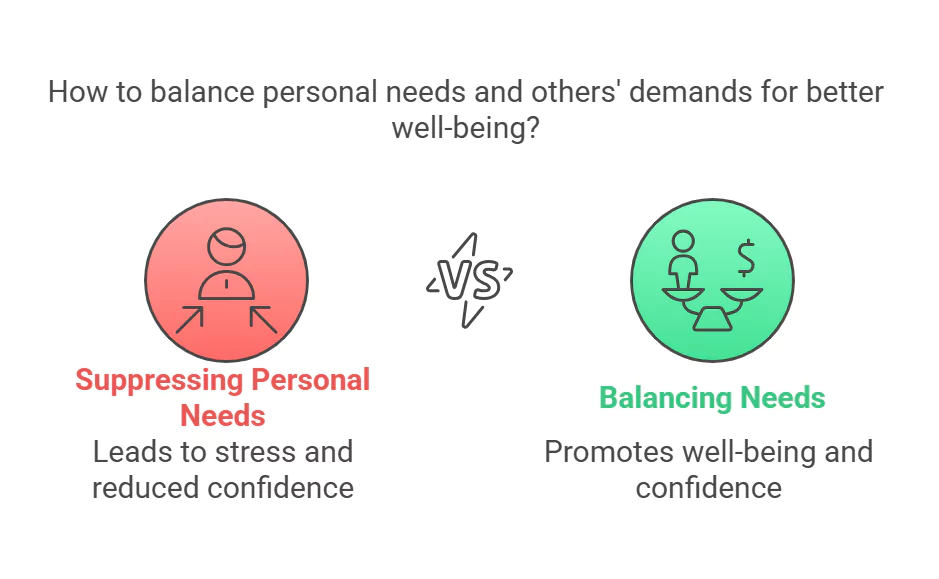
How to Set Boundaries
Practice saying no in a way that feels natural. Something like, “I’d love to help, but I’ve got too much on my plate right now.” Remember, boundaries aren’t mean—they’re necessary for your sanity.
5. Procrastination is Your Middle Name
We’ve all been there. You’ve got something important to do, but instead of starting, you’re cleaning out your closet, watching YouTube videos, or scrolling TikTok. You tell yourself you’ll get to it later, but “later” always feels just out of reach.
What This Looks Like
- Putting things off until the last minute and then stressing out.
- Convincing yourself you work better under pressure (even though you don’t).
- Spending more time planning than actually doing.
Why We Do It
A 2023 study in Frontiers in Psychology says procrastination usually stems from fear—fear of failure, imperfection, or just feeling overwhelmed. Sound familiar?
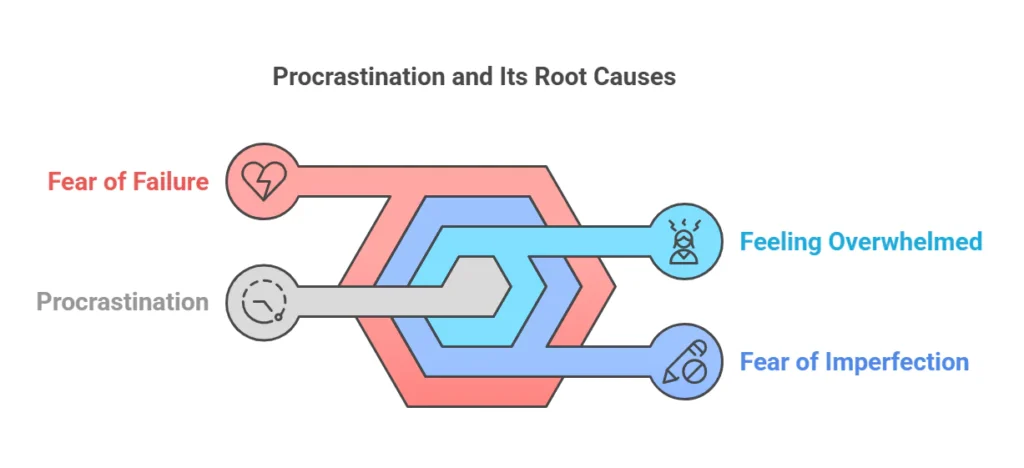
How to Beat It
Break tasks into smaller pieces. Set a timer for 10 minutes and focus on just one thing. Sometimes, just getting started is all you need to build momentum.
6. Your Inner Critic Won’t Shut Up
We all have that voice in our head. You know, the one that says, “You’re not good enough,” or, “Why even bother?” It’s like having a really mean roommate living rent-free in your brain.
What It Looks Like
- Telling yourself you’re not smart or talented enough to succeed.
- Comparing yourself to others and feeling like you don’t measure up.
- Focusing on your flaws instead of your strengths.
Why This is So Harmful
A report from the National Institute of Mental Health found that constant negative self-talk can lead to anxiety, depression, and low confidence.

How to Quiet That Voice
When you catch yourself being self-critical, ask, “Is this really true?” Most of the time, it’s not. Practice talking to yourself the way you’d talk to a friend—with kindness and encouragement.
7. You Feel Like a Total Fraud
Imposter syndrome is real, and it’s brutal. Even when you’ve worked your butt off, you still feel like you don’t deserve your success. Sound familiar?
What It Looks Like
- Thinking your achievements are just luck or a fluke.
- Worrying that people will “find out” you’re not as good as they think.
- Always comparing yourself to others and feeling like you fall short.
How to Push Past It
Keep a running list of your accomplishments—big and small. When that self-doubt creeps in, pull out your list and remind yourself of everything you’ve done. You’re not a fraud. You’re capable, and you’ve earned your place.
8. You Avoid Taking Risks
Let’s be honest—risks can be downright scary. I mean, who wants to fail? What if everything blows up in your face? But here’s the thing: playing it safe all the time can actually be riskier in the long run. Staying stuck where you are—especially if you’re not happy—keeps you from growing into the person you’re meant to be.
What This Looks Like
- You stick with the same old routine, even if it’s boring or unfulfilling.
- You talk yourself out of opportunities because they feel “too risky” or “too uncertain.”
- You look at people who take big chances and think, “I could never do that.”
Why We Avoid Risks
It’s not just you—our brains are wired to avoid loss more than they seek gain. A 2021 study in Psychological Science calls this “negativity bias.” Basically, we focus so much on what could go wrong that we forget to think about what could go right. But here’s the twist: avoiding risks can mean avoiding growth. You could miss out on the things that actually make life exciting and rewarding.
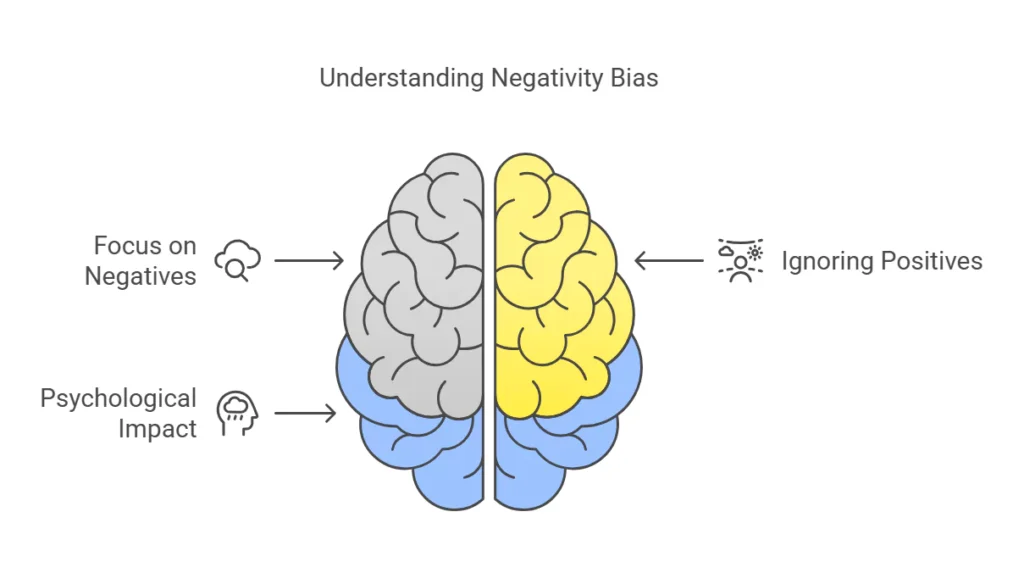
How to Push Past the Fear
Reframe how you think about risk. Instead of focusing on failure, try asking yourself, “What could I learn from this?” or “What’s the worst that could happen, and can I handle it?” Chances are, you’ll realize you’re tougher than you give yourself credit for. Start small—take a step that feels slightly uncomfortable but still doable. Baby steps can lead to big changes.
9. You Don’t Prioritize Yourself
When was the last time you did something just for you? If you’re always putting everyone else first—your job, your family, your friends—it’s no wonder you’re feeling burned out. Here’s the truth: you can’t pour from an empty cup. Taking care of yourself isn’t selfish; it’s necessary.
What This Looks Like
- You’re constantly exhausted but still push yourself to keep going.
- You feel guilty when you take a break or say no to someone.
- You rarely take time for hobbies, relaxation, or things that bring you joy.
Why This is a Problem
When you’re running on empty, you’re not showing up as your best self for anyone—not your loved ones, not your work, and definitely not yourself. A study in the Journal of Occupational Health Psychology even found that neglecting personal needs leads to higher stress levels, lower productivity, and more physical health problems. That’s no way to live.

How to Start Putting Yourself First
It doesn’t have to be a huge change. Block out 30 minutes a day just for you—read a book, go for a walk, or do absolutely nothing. Tell people, “I need this time to recharge,” and stick to it. The more you show yourself love and care, the better you’ll feel—and the more energy you’ll have to give to others.
10. You Struggle to Visualize Success
If you can’t picture yourself winning, it’s hard to believe it’s possible. Visualization might sound a little “woo-woo,” but trust me—it’s legit. Athletes, CEOs, and high achievers use it all the time to stay focused and motivated.
What This Looks Like
- You spend more time thinking about obstacles than opportunities.
- Your dreams feel so far away that they don’t even seem real.
- You struggle to imagine what success would actually look or feel like.
Why Visualization Works
Here’s the science: research from the Journal of Applied Psychology found that people who regularly visualize their success are 23% more likely to achieve their goals. Why? Because imagining your win trains your brain to recognize opportunities and take action when they pop up. It’s like setting your mental GPS to your dream destination.
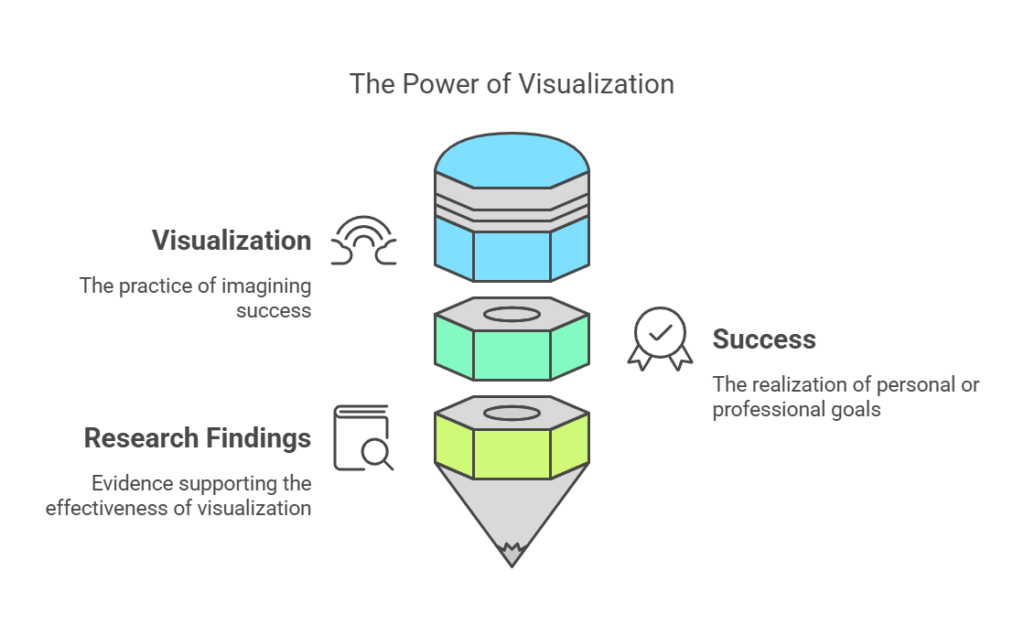
How to Get Started
Set aside a few minutes a day to picture your ideal outcome. Go all in—what does it look like, feel like, even smell like? Write it down if it helps or create a vision board to keep your goals front and center. It might feel a little silly at first, but trust me, it works.
You’re Not Alone
Here’s the thing: we all struggle with this stuff at some point. Nobody’s immune to fear, doubt, or the pull of the comfort zone. But the fact that you’re here, thinking about these things, means you’re ready to make a change—and that’s huge.
5 Simple Tips to Get Started
- Start Small: Choose one thing from this list and take the tiniest step toward it today.
- Celebrate the Little Wins: Did you say no to something? Start a project? That’s progress—own it!
- Talk Nicely to Yourself: If you wouldn’t say it to a friend, don’t say it to yourself.
- Find Your Cheerleaders: Share your goals with someone who’ll hype you up or keep you accountable.
- Keep Growing: Listen to a podcast, read a book, or find inspiration from people who’ve been where you are.
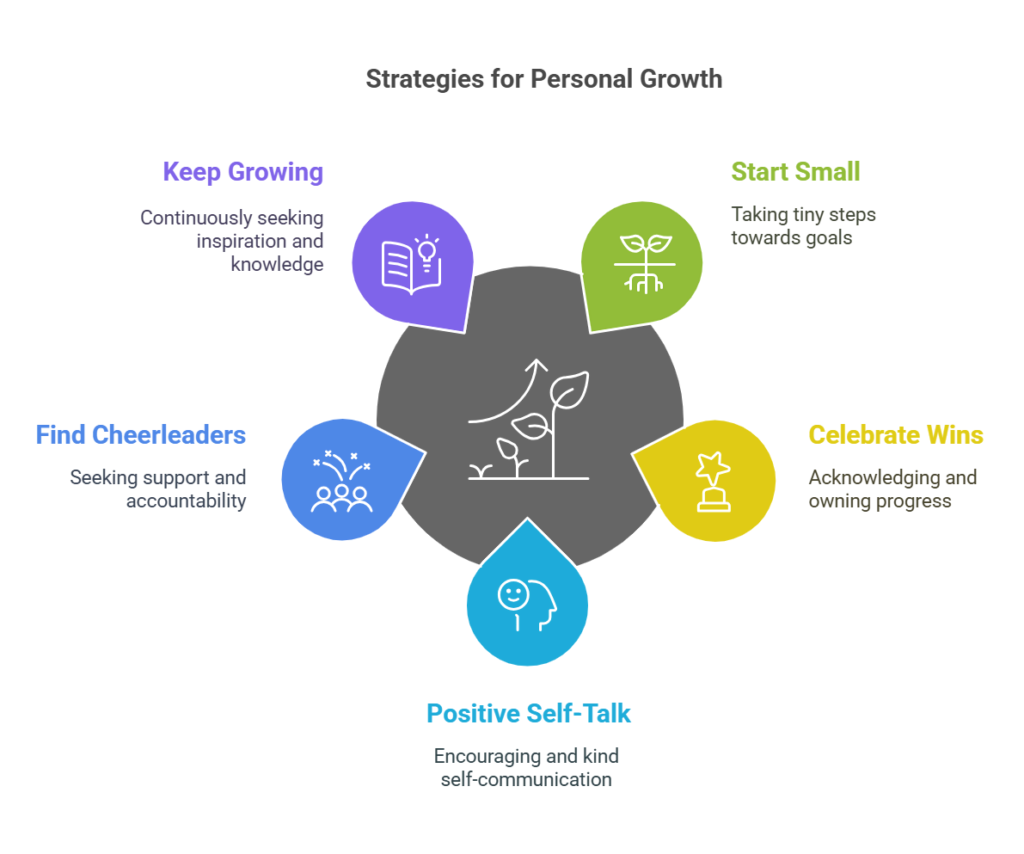
Your Fresh Start Starts Now
Breaking out of these habits isn’t like flipping a magic switch and waking up as a totally different person. It’s more like peeling back layers, little by little, and figuring out what’s been holding you back. It’s about spotting those sneaky patterns that trip you up and taking small, intentional steps to move past them. Some days it’ll feel like you’re crushing it, and other days? Not so much—and that’s completely okay. Progress isn’t always pretty, but man, is it worth it.
So, what’s one small thing you can do today to start moving forward? Go for it—you’ve got this!







